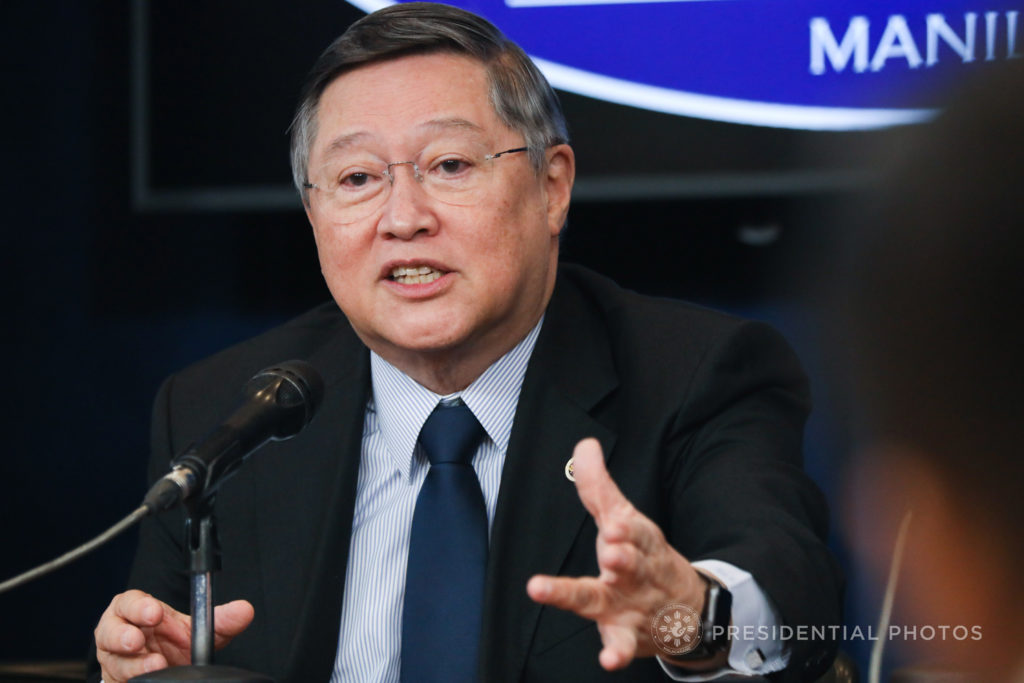
Finance Secretary Carlos Dominguez III. (File Photo by TOTO LOZANO / Presidential Photographers Division)
MANILA, Philippines—The government had already identified a source of cash aid when Metro Manila reverts to enhanced community quarantine (ECQ), the most stringent form of lockdown, from Aug. 6 to 20, according to Finance Secretary Carlos Dominguez III on Wednesday (Aug. 4).
“We were informed that the amount required is about P12 billion, and we have indicated that we have sufficient excess revenue to cover this,” Dominguez said, referring to the dole outs for most Metro Manila families during the 15-day ECQ meant to slow transmission of Delta, a SARS Cov2 variant that the US Centers for Disease Control and Prevention (CDC) said was as contagious as chickenpox.
Chickenpox is transmitted 90 percent of the time by an infected individual, according to CDC.
Dominguez said the funding came from government-owned and/or -controlled corporations (GOCC)
Under Republic Act (RA) No. 7656, or the GOCC Dividend Act, all state-run firms were mandated to declare and remit at least half of their annual incomes to the national government as dividends. Last year, the national government ordered GOCCs to remit their dividends in advance to boost the government’s COVID-19 war chest.
Pending in Congress was a Department of Finance (DOF)-backed bill to institutionalize a minimum of 75 percent of state-run corporations’ earnings as mandatory dividend remittances to the national government. This was in order to collect more revenues while the government planned to wind down its ballooning debt which was partly a result of massive borrowings to fund COVID response.
Dominguez said there was “no need for any [budget] realignment at this point,” unlike in 2020 when the bulk of funds set aside for the Bayanihan to Heal as One Act or Bayanihan 1 came from realigned budget items.
For instance, infrastructure agencies like the Department of Public Works and Highways (DPWH) and Department of Transportation (DOTr) suffered budget cuts as billions of pesos were instead transferred to pandemic response, delaying the implementation of some projects.
In a tweet on Wednesday, former National Economic and Development Authority (Neda) secretary Ernesto Pernia urged a realignment of some infrastructure funds to dole outs.
“Given the financial straits for ‘ayuda’ needed during the upcoming two-week lockdown, some amounts should be repurposed from the budget for less urgent infrastructure projects,” Pernia said.
“P4,000 is adequate for one week only. Household spending can also be an economic stimulus,” Pernia said.
Pre-pandemic, private sector and household consumption accounted for about three-fourths of the Philippine economy.
International aid group Oxfam International also on Wednesday urged the Philippine government to draw from the International Monetary Fund’s (IMF) biggest ever, $650-billion special drawing rights (SDG) allocation to finance the prolonged fight against the COVID pandemic.
But Dominguez said the Philippines was not considering tapping this IMF facility.
“Philippine officials have claimed that the government is facing difficulties in meeting the costs of much-needed financial aid for Filipinos during the COVID-19 pandemic,” Oxfam said in a statement.
“The SDRs are something that the government can look into,” Oxfam said.
“With the approval of the SDR allocation, the Philippines is set to receive $2.79-billion worth of SDRs,” said the group.
“Oxfam International calculated this amount based on the quota share that the Philippines has in the IMF which is 0.43 percent,” it said.
“The SDRs are not loans and do not need to be repaid,” Oxfam said.
“However, they can incur an SDR interest rate if used. Their usage is decided by the receiving country to bolster their reserves, pay for imports, pay off debts or to fund domestic public investments although it may require new legislation or legal amendments in some countries,” it noted.
TSB

